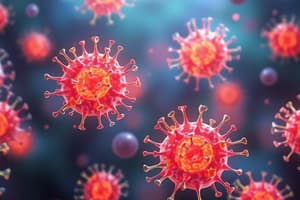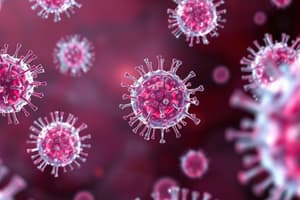Podcast
Questions and Answers
What type of cells do effector B lymphocytes develop into?
What type of cells do effector B lymphocytes develop into?
- Natural killer cells
- Cytotoxic T lymphocytes
- Memory cells
- Antibody-secreting plasma cells (correct)
Which cytokine is primarily secreted by Th1 cells?
Which cytokine is primarily secreted by Th1 cells?
- Tumor necrosis factor-alpha
- Interferon-γ (correct)
- Interleukin-4
- Interleukin-10
What is the main function of CD8+ cytotoxic T lymphocytes (CTLs)?
What is the main function of CD8+ cytotoxic T lymphocytes (CTLs)?
- To secrete antibodies
- To activate B lymphocytes
- To mediate delayed-type hypersensitivity reactions
- To kill infected cells (correct)
What role does perforin play in CTL-mediated killing?
What role does perforin play in CTL-mediated killing?
What is required for the differentiation of CD8+ T cells into functional CTLs?
What is required for the differentiation of CD8+ T cells into functional CTLs?
Which type of helper T cell is associated with the immune response against helminths?
Which type of helper T cell is associated with the immune response against helminths?
What type of immunity is primarily mediated by T lymphocytes?
What type of immunity is primarily mediated by T lymphocytes?
Which cells act as antigen-presenting cells essential for T cell activation?
Which cells act as antigen-presenting cells essential for T cell activation?
Which cells are primarily responsible for phagocytosis and microbial killing functions in the immune system?
Which cells are primarily responsible for phagocytosis and microbial killing functions in the immune system?
What is the function of tissue-resident macrophages?
What is the function of tissue-resident macrophages?
From which precursor cell do B and T lymphocytes originate?
From which precursor cell do B and T lymphocytes originate?
What distinguishes naive B and T cells from their effector forms?
What distinguishes naive B and T cells from their effector forms?
Which immune cells are uniquely capable of activating naive T lymphocytes?
Which immune cells are uniquely capable of activating naive T lymphocytes?
Where do T cell precursors migrate to mature?
Where do T cell precursors migrate to mature?
Which type of leukocyte is considered the most abundant in the blood?
Which type of leukocyte is considered the most abundant in the blood?
What role do monocytes play when recruited to sites of tissue infection?
What role do monocytes play when recruited to sites of tissue infection?
What is the primary function of cytokines produced by antigen-presenting cells in T cell differentiation?
What is the primary function of cytokines produced by antigen-presenting cells in T cell differentiation?
Which transcription factor is important for T follicular helper (Tfh) cells to express high levels of inducible costimulator (ICOS)?
Which transcription factor is important for T follicular helper (Tfh) cells to express high levels of inducible costimulator (ICOS)?
Which cytokine secreted by Th2 cells primarily promotes IgE production?
Which cytokine secreted by Th2 cells primarily promotes IgE production?
What role does CD40 ligand (CD40L) play in the activation of B cells by Th cells?
What role does CD40 ligand (CD40L) play in the activation of B cells by Th cells?
How do Th1 cells contribute to the destruction of intracellular microbes?
How do Th1 cells contribute to the destruction of intracellular microbes?
What key event occurs within germinal centers during T cell-dependent antibody responses?
What key event occurs within germinal centers during T cell-dependent antibody responses?
What is the effect of IL-5 secreted by activated Th2 cells?
What is the effect of IL-5 secreted by activated Th2 cells?
What distinguishes the cytokine profiles of Th1 and Th2 cells?
What distinguishes the cytokine profiles of Th1 and Th2 cells?
Flashcards are hidden until you start studying
Study Notes
Immune Cells and Subsets
- Effector cells in innate and adaptive immunity include phagocytes (neutrophils, macrophages), mast cells, basophils, eosinophils, dendritic cells, and NK cells and lymphocytes.
- Cells have surface molecules, named using the CD nomenclature, that differ from cell to cell and between subsets of cells.
- Neutrophils are the most abundant blood leukocytes, have a segmented nucleus, and abundant lysosomal granules. They are rapidly recruited to sites of infection and injury where they perform phagocytic and microbial killing.
- Tissue-resident macrophages are sentinel cells that detect microbes, alert the immune system, and perform specialized functions in different tissues.
- Monocytes are circulating phagocytes that migrate to sites of infection and injury, differentiate into macrophages, and secrete cytokines and chemokines that attract leukocytes.
- Dendritic cells (DCs) are bone marrow-derived cells that function as innate sentinel cells and antigen-presenting cells (APCs). They are uniquely capable of activating naive T lymphocytes. Different subsets of DCs have different functions in innate and adaptive immunity.
Lymphocytes
- B and T lymphocytes have diverse and specific antigen receptors, responsible for adaptive immune responses.
- B and T lymphocytes originate from a common precursor in the bone marrow. B cell development occurs in the bone marrow, T cell development occurs in the thymus. After maturation, B and T cells leave the thymus or bone marrow, enter the circulation, and populate peripheral lymphoid organs.
- Naive B and T cells are mature lymphocytes that have not been exposed to their specific antigen.
- Upon encountering their specific antigen, these lymphocytes proliferate and differentiate into effector lymphocytes.
- Effector B cells are antibody secreting plasma cells.
- Effector T cells include cytokine-secreting CD4+ helper T cells and CD8+ CTLs.
- Some progeny of activated B and T cells differentiate into memory cells, which survive for long periods and respond rapidly in subsequent exposures to the same antigen.
Cell-mediated Immunity & CD8+ T Cells
- Cell-mediated immunity is the adaptive immune response to microbes inside host cells. It is mediated by T lymphocytes.
- CD8+ T cells proliferate and differentiate into cytotoxic T lymphocytes (CTLs), which kill infected cells.
- CTL differentiation is driven by antigen presentation by dendritic cells, signals from CD4+ helper T cells, costimulation, and cytokines.
- CD8+ CTLs kill cells that express peptides derived from cytosolic antigens (e.g., viral antigens) presented in association with MHC molecules.
- CTLs kill by exocytosis of granules containing granzymes and perforin. Perforin facilitates granzyme entry into the cytoplasm of target cells, and granzymes initiate apoptosis. Granulysin, another granule protein, destroys intracellular bacteria and fungi.
- CD8+ T cells also secrete interferon-γ and may contribute to defense against phagocytosed microbes and delayed-type hypersensitivity reactions.
CD4+ Helper T Cells
- Naive CD4+ T lymphocytes can differentiate into several specialized effector T cells, including:
- Th1 cells: secrete interferon-γ (IFN-γ), which mediate defense against intracellular microbes.
- Th2 cells: secrete interleukin-4 (IL-4) and IL-5, which favor IgE- and eosinophil/mast cell--mediated immune reactions against helminths.
- Th17 cells: promote inflammation and mediate defense against extracellular fungi and bacteria.
- Differentiation of naive CD4+ T cells is influenced by cytokines produced by antigen-presenting cells and other cells, and by the T cells themselves.
- Differentiation is controlled by transcription factors that promote cytokine gene expression and epigenetic changes in cytokine gene loci, leading to commitment to a specific subset.
Helper T Cell Roles in B Cell Activation
- Activated helper T cells engage CD40 on B cells and secrete cytokines that bind to cytokine receptors on B cells.
- These signals promote B cell proliferation and differentiation.
- Some activated helper T cells differentiate into T follicular helper (Tfh) cells, which express high levels of inducible costimulator (ICOS) and CXCR5, and secrete interleukin-21 (IL-21).
- Tfh cells and antigen-activated B cells migrate to follicles, where Tfh cells activate these specific B cells to initiate the formation of germinal centers.
- Late events in T cell-dependent antibody responses (e.g. isotype switching, somatic mutation, affinity maturation, generation of memory B cells, and induction of long-lived plasma cells) take place in germinal centers.
Helper T Cell Roles in Phagocyte Activation
- Th1 cells recognize antigens of microbes that have been ingested by phagocytes and activate the phagocytes to kill the microbes.
- IFN-γ and CD40L-CD40 interactions mediate macrophage activation by Th1 cells.
- Activated macrophages kill phagocytosed microbes in phagolysosomes using reactive oxygen and nitrogen species and enzymes (classical macrophage activation).
- Activated macrophages also stimulate inflammation and can cause tissue damage.
- Th2 cells recognize antigens produced by helminths and other microbes, and environmental antigens associated with allergies.
- IL-4 promotes B cell class-switching and production of IgE, leading to mast cell degranulation and inflammation.
- IL-5 from activated Th2 cells activates eosinophils to release granule contents that destroy helminths, but also may result in host tissue damage.
Studying That Suits You
Use AI to generate personalized quizzes and flashcards to suit your learning preferences.




